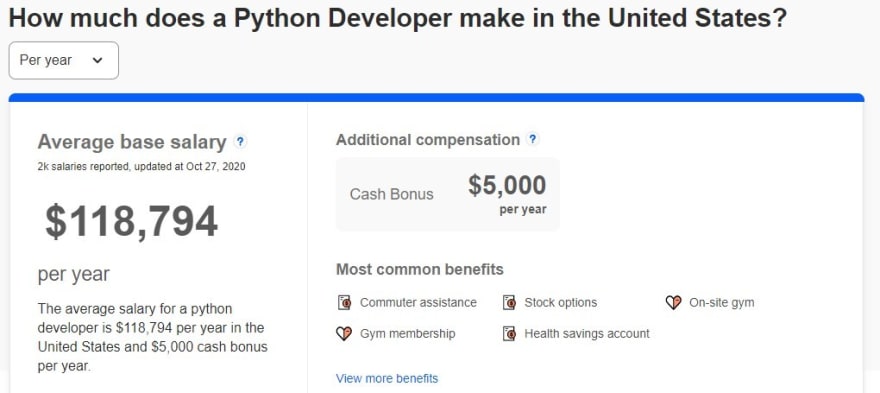Nowadays Python is one of the most universal and reliable programming languages to learn. Guido van Rossum developed this high-level and object-orientated programming language in 1980.
Many coders admit that Python is one of the easiest languages to learn, as it requires a unique syntax focusing on readability. In fact, Python codes are much easier to understand for developers than the other languages. That is just a small asset of what Python means in the current computer science environment.
If you are thinking to learn Python or already started coding with Python but still looking for some available resources, then you have come to the right place. Here we list some powerful free Python resources you may use right away. Take advantage of learning from free resources, as it does not require a credit card or paying for the course. All you need is time and hunger to learn. But first, let’s dive into some theory.
What are the benefits of Python?
Many advantages of Python have come from the variety of libraries amassed since 1991. These libraries are advanced tools that handle a lot of coding for you. Scrapy, Requests, or BeautifulSoup libraries can extract data from webpages. SciPy, Pandas, or NumPy may assist you in manipulating and analyzing massive datasets.
Logically, software developers usually turn to Python for data science, web scraping, statistics, and artificial intelligence. However, it is also advancing into web development.
Python programming can even open doors to a beginner. It worth it, as the average yearly salary for a Python developer in the U.S., is more than $118K+.
Python is likely to stay relevant for years to come. This programming language has gained popularity from the last year or two, surpassing C#.
Best Places to Learn Python Online
There are so many resources where you can learn Python online for free. Here we propose just as some sources as possible but still with some options.
1. Udemy
This is a reliable and popular online course platform that has the biggest collection of online courses about everything. Here you do not need any subscription. Create a free account, and enroll in free Python programming courses.
This is a common practice when instructors keep their courses free when they first launch them. It gives them some traction, social proofs, and reviews. The strong side of Udemy is that you get to learn from experts, but it is not so interactive as some other courses.
2. CodeCademy
Codecademy is one of the best places for interactive learning, where you get theory and then are just asked to write code online. You will not need to do any setup like installing Python in your machine, as you may run Python code right from your browser. Additionally, you don't have to write a complete program until you are ready. You will have to make some changes and execute them. Many admit that this is a cozy way to learn Python.
There are free and paid courses there. If you can afford CodeCademy, subscribe and start with their Python 2 course. It looks great for beginners with no coding experience.
3. LinkedIn Learning
LinkedIn Learning is a subsidiary of LinkedIn. It was formed as an online support platform for books and classes of Lynda Weinman (known from 1995). Then in 2015 LinkedIn announced its intention to buy the platform. The platform has been rebranded to Lynda.com from LinkedIn.
Now, this is a leading online learning center that focuses on helping people to learn software development, business, technology, project management, and other skills. The courses are held by only industry experts, such as professional Python developers.
4. Coursera
If you want to learn Python for free, getting the expertise from the world's leading universities, then Coursera is what you actually need. It proposes online courses taught at famous universities such as Stanford and the National University of Singapore.
Their course Python - Programming for Everybody is one of the clearest and popular free courses to learn. It will teach you Python 3 from scratch. You will not need prior programming experience because you will learn in the course.
This course is a part of the Python for Everybody Specialization that also contains 4 more classes to learn Python (Python Data Structure, Using Python on Access Web Data, Using Database with Python, and Capstone Project: Retrieving, Processing, and Visualizing Data with Python).
5. Google's Python Class
Did you know that Google itself uses Python for many of its projects Google's Python class is a nice set of Python tutorials for beginners? This class suits people with a little bit of programming experience and who want to know more about Python.
The Python class includes written tutorials, lecture videos, and many code exercises to practice Python programming language. You will learn basic Python concepts like strings and lists and will prepare for the next exercises, which are full programs dealing with text files, processes, and HTTP connections. By the way, the lecture videos of the class are available on YouTube.
6. Microsoft's Python Course
Microsoft does not leave behind as well. It proposes you to learn its free Python course on Edx, another popular online portal for free education. The course is titled "Introduction to Python: Absolute Beginner" and is taught by Eric Camplin, Senior Content Developer.
It will teach you Python in Jupyter Notebooks, an online browser-based coding editor for Python. This is a 5-week course with 3-4 studying hours every week.
7. CodeMentor
Another great place to learn Python is a one-on-one education platform CodeMentor. It has been created to provide instant help for software developers by sharing videos, screens, and text chats between instructors and students.
The system that CodeMentor provides duplicates the real-life situation of a student and a teacher to have the most useful user experience on programming and debugging.
CodeMentor helps programmers to train with expert developers in Python and other programming languages. Students can ask questions in two different ways on the platform: to ask directly on the website (and later be matched a certain mentor) and to ask programmers to embed widgets on their blogs to let followers ask the questions directly from posts.





Top comments (0)